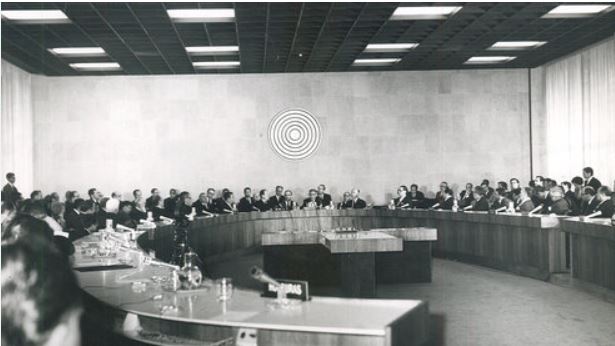April 22, 2023 marks the 55th anniversary of the entry into force of the Treaty of Tlatelolco, a multilateral international act establishing a nuclear-free zone in Latin America and the Caribbean.
In connection with this significant event, PIR Center held a blitz-interview with Sergio Duarte, President of Pugwash Conferences on Science and World Affairs, member of PIR Center Advisory Board since 2022.
As part of the conversation, the importance of the Tlatelolco Treaty for the regional security system and the nuclear nonproliferation regime was discussed, as well as the prospects for expanding the positive experience of Latin American countries to other regions.
The interview was conducted by PIR Center intern Roman Kalinin.
Roman Kalinin: How do you assess the influence of the Tlatelolco Treaty on the nonproliferation regime?
Sergio Duarte: The Treaty of Tlatelolco preceded the NPT. The first suggestion of a continental ban on nuclear weapons in Latin America was made by the Brazilian Minister of External Relations Afonso Arinos de Melo Franco at the United Nations General Assembly in 1961. It was inspired by Resolution 1652 on the denuclearization of Africa, adopted at the XVI Session of the UNGA. On the early history of the Treaty I suggest that you look for Professor Paulo Wrobel’s work on Brazil and the NPT. There is a whole well-documented section devoted to the genesis and negotition of the Treaty of Tlatelolco.
The Treaty of Tlatelolco has certainly withstood the test of time. Since its inception,all its parties have faithfully complied with their obligations. None of the countries in the region have acquired nuclear weapons. All signed and ratified the CTBT. The Treaty was amended to include the Caribbean countries and its parties explicitly renounced nuclear explosions, which were permitted, under certain conditions, in the original text of the Treaty. The wide majority of Latin American and Caribbean states supported the Treaty on the Prohibition of Nuclear Weapons (TPNW) and the majority have become parties to it.
Roman Kalinin: In your opinion, how has the Treaty affected the regional stability in Latin America?
Sergio Duarte: Latin America has always been a very stable region. The last major conflicts took place in the Southern part of South America in the mid19th century, between Mexico and the United States at around the same time and between Chile and a Bolivia-Peru alliance toward the end of that century. Since then, no wars have been fought between Latin American countries and a few diferences about boundaries have been settled by peaceful means. All boundaries of Brazil with its many neighbors have been settled by negotiation and/or arbitration in the beginning of the 20th century.
It is worth noting that in 1826 Simón Bolívar organized a meeting of Latin American republics known as the Panama Congress, or Amphyctionic League, which together with other continental initiatives provided the background for the establishment of the Organization of American States (OAS) in 1948. The common Iberian cultural heritage of Latin America and parts of the Caribbean has been an important foundation for the region’s stability and integration as well as for the solid friendly relations among them.
Roman Kalinin: How do you assess the perspectives of creation of NWFZ in other regions of the world? If positively, please specify on the regions where it is possible?
Sergio Duarte: There are proposals for the creation of NWFZ’s in the Middle East (actually, a zone free of weapons of mass destruction), in the Arctic region and in Southeast Asia.
MENWFZ: A number of states of the Middle East have been actively promoting the establishment of such a zone in that region since 1974. This issue was the subject of a resolution adopted by the Review and Extension Conference of the NPT as one of the commitments that made possible the extension. In the past couple of years some Middle Eastern states have renewed their efforts. No progress has been possible, but it is certainly most desirable that agreement is reached.
Arctic: Some states on the Arctic Ocean rim have been advocating the creation of a nuclear weapon free zone and warning that the melting of he ice cap will inevitably produce instability n the region. However, there seems to be little possibility of progress.
NE Asia: So far, proposals have been limited to academics from the region. In the present circumstances, such a zone has the least possibility of success.
Note: With regard to Latin America, a Zone of Peace and Cooperation in the South Atlantic was established in 1986. All states on the Eastern South America coast and the Western African coast are party to that zone.
Roman Kalinin: Many Latin American countries eventually became strong proponents of the World without nuclear weapons and ratified or signed TPNW. How would you assess the prospects of this Treaty and its influence on the existing nonproliferation regime?
Sergio Duarte: I mentioned above the broad support by Latin American states to the TPNW. Legislative branches in some signatory states have yet to finalize the action needed for ratification. The TPNW is the most important international instrument in the field of nuclear non-proliferation and disarmament adopted by the international community since 1996 (the CTBT was adopted then, but is not yet formally in force).
The TPNW complements the NPT and provides a path for the elimination of nuclear weapons. Thus, it reinforces the non-proliferation regime and promotes disarmament. It expresses the repudiation of the international community to nuclear weapons. Nations that possess such weapons should understand that instead of creating security, nuclear weapons are in fact a fator of insecurity for all. The risks inherent in the use of such weapons are unacceptable because of their catastrophic and indiscriminate consequences.
Key words: Latin America; blitz;
NPR/NPT



